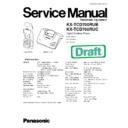Panasonic KX-TCD700RUB / KX-TCD700RUC Service Manual ▷ View online
Circuit Diagram
KX
-T
CD7
00RU
B
/
/
K
X
-T
CD7
00RU
C
21
5.2. THE LINE INTERFACE SECTION (SEE BLOCK DIAGRAM Fig. 17)
5.2.1. INTRODUCTION
This section consists of the telephone line interface, bell detector, charge-pulse detector, hook switch, pulse dialing circuits,
audio circuits, DC mask & line impedance circuits, power supplies, and battery charger circuits.
audio circuits, DC mask & line impedance circuits, power supplies, and battery charger circuits.
5.2.2. TELEPHONE LINE INTERFACE (SEE Fig. 19)
The telephone line is connected to a bridge rectifier D8. Surge suppressor SA3 protects against excessive line voltages. Test
points are TP40 (A), TP26 (B). A 16 kHz notch filter L3 and L5 block the 16 kHz “charge pulse” signal from the rest of the line
input circuitry. Bridge rectifier D8 provides for lines of either polarity. The output of D8 is “Line +” (TP39) and “Line -” which is
ground.
points are TP40 (A), TP26 (B). A 16 kHz notch filter L3 and L5 block the 16 kHz “charge pulse” signal from the rest of the line
input circuitry. Bridge rectifier D8 provides for lines of either polarity. The output of D8 is “Line +” (TP39) and “Line -” which is
ground.
5.2.3. EARTH RECALL (SEE Fig. 19)
For countries that require Earth Recall facilities, relay RL1 is provided to short the E line to the A or B lines. The relay is
energized when transistor T2 is switched on by a high level on the EARTH control line from the BB-IC IC8. D1 will quench the
large back-emf voltage that would otherwise occur across the relay coil when T2 turns off.
energized when transistor T2 is switched on by a high level on the EARTH control line from the BB-IC IC8. D1 will quench the
large back-emf voltage that would otherwise occur across the relay coil when T2 turns off.
5.2.4. BELL DETECTOR (SEE Fig. 19)
The AC ringing signal is detected by phoptocoupler IC2, using its internal diode in conjunction with D4. DC from the line is
blocked by C2. The other components D2, D3, and R3 reduce current and increase the circuit impedance in line with national
requirements. When ringing is detected IC2 will turn on, and the RING line will be dragged to a low voltage.
blocked by C2. The other components D2, D3, and R3 reduce current and increase the circuit impedance in line with national
requirements. When ringing is detected IC2 will turn on, and the RING line will be dragged to a low voltage.
5.2.5. CLIP CIRCUITS (SEE Fig. 19)
The CLIP signal is detected by IC3 and sent to the BBIC through the /TXAF line as a square waveform. The CLIP_STATE
signal from the BBIC is used to provide a CLIP impedance through a combination of components selected from R85, R86, C93,
C37, C97 and R1. The combination depends upon the CLIP requirements of the specific country - often there is no
requirements for the CLIP_STATE impedance.
signal from the BBIC is used to provide a CLIP impedance through a combination of components selected from R85, R86, C93,
C37, C97 and R1. The combination depends upon the CLIP requirements of the specific country - often there is no
requirements for the CLIP_STATE impedance.
T10 disables the CLIP signal during the off-hook condition.
22
KX-TCD700RUB / KX-TCD700RUC
Circuit Diagram
23
KX-TCD700RUB / KX-TCD700RUC
5.2.6. HOOKSWITCH AND PULSE DIALING (SEE Fig. 20)
T8 is the hookswitch, driven by T9. When the phone is “off-hook”, the HOOK control signal from the BBIC will be a high logic level
(+3V), and both transistors will be on, thus T8 will “loop” the line. The zenner diode D10 protects transistors T11 to T13 against
transient line voltages.
(+3V), and both transistors will be on, thus T8 will “loop” the line. The zenner diode D10 protects transistors T11 to T13 against
transient line voltages.
5.2.7. PULSE DIALING (SEE Fig. 20)
During pulse dialing the hookswitch (T8, T9) is used to generate the pulses using the HOOK control signal, which is set high
during pulses. To force the line impedance low during the “pause” intervals between dial pulses, the PULSE_DIAL signal turns
on T11.
during pulses. To force the line impedance low during the “pause” intervals between dial pulses, the PULSE_DIAL signal turns
on T11.
5.2.8. AUDIO CIRCUITS (SEE Fig. 20)
The line output signal from the BBIC RXAF is amplified by T13. The RXAF line is DC coupled to T13 thus making it work as
a current limiter (typically < 8mA). The emitter load of T13 is complex to achieved the correct frequency response, since the line
load (for Germany) is also complex. The line input signal TXAF is taken from the junction of R41 and R70. Phase cancellation
of the line output audio occurs at this point, so that only incoming line audio should be passed to the BBIC on TXAF.
a current limiter (typically < 8mA). The emitter load of T13 is complex to achieved the correct frequency response, since the line
load (for Germany) is also complex. The line input signal TXAF is taken from the junction of R41 and R70. Phase cancellation
of the line output audio occurs at this point, so that only incoming line audio should be passed to the BBIC on TXAF.
Circuit Diagram
24
KX-TCD700RUB / KX-TCD700RUC
Click on the first or last page to see other KX-TCD700RUB / KX-TCD700RUC service manuals if exist.

